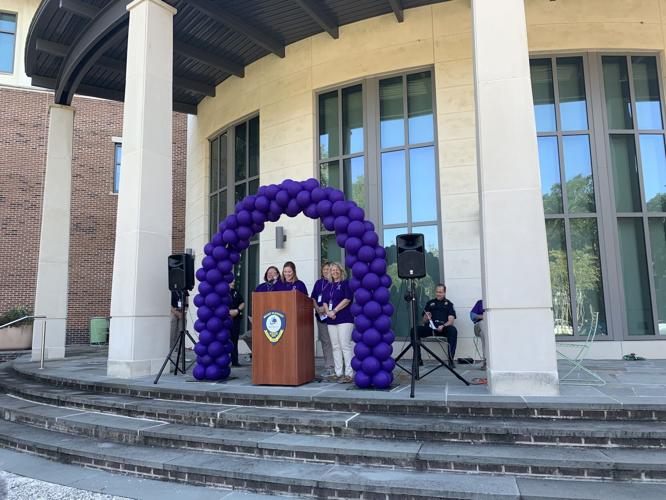South Carolina is ranked sixth in the country for women killed by domestic partners.
Domestic violence does not discriminate based on gender, race or socioeconomic status, and it occurs everywhere, including Mount Pleasant.
In 2020, the Mount Pleasant Police Department responded to 282 calls for domestic violence, said Police Chief Mark Arnold. “Unfortunately, we know that domestic violence is one of the types of crimes that is significantly underreported,” he said, adding that the number of instances could be two times what is reported.
Lindsey Schwenk, LISW-CP, works with domestic abuse survivors each day as the Mount Pleasant Police Department’s embedded mental health clinician.
“It can realistically happen to anyone. The stories that I hear are very, very similar,” Schwenk said. “Oftentimes, people don’t realize they’re in an abusive relationship until it’s too late and things have escalated.”
October is Domestic Violence Awareness month and the Town hosted an event on Oct. 15 to provide the public with information on domestic abuse and showcase resources within the community.
Resources from the department
As the embedded mental health clinician, Schwenk provides free therapy sessions to victims of domestic violence to help them through the healing process. Additionally, she assists clients with the court process if that applies to their situation.
The police department’s victim services team includes Schwenk, Sgt. Katelyn Labrie and three law enforcement victim advocates, Ruth Tocco, Monica Kropp and Becky Tapia-Cooper, who works with the senior citizen population.
Schwenk’s role as the embedded mental health clinician is funded by a national grant from the Victims of Crime Act (VOCA) that was established to provide additional services to victims of crime. This means the victims receive therapy services at no cost to them.
Each day the victim advocates read incident reports and look for instances of domestic violence. They make the first contact with the victim to see if they need assistance and gauge how distressed they are. Depending on the situation, the victims are then referred to Schwenk for therapy services.
The main goals of the victim services are intervention and prevention. The victim advocates also attend court hearings with the victim, help people file orders of protection or restraining orders and they host a domestic violence support group that meets regularly.
Schwenk said safety is the top priority when dealing with domestic violence situations, especially if the victim is still in the abusive environment. For example, victim advocates might only make calls to victims when they are at work and away from the abuser.
If the victim is in danger, they establish a safety plan to get out of the situation. Other organizations, including Liza’s Lifeline, provide additional financial assistance to victims of domestic violence.
Schwenk’s office provides yearly training to the police department regarding mental health tactics, along with other training the officers receive. Last year, the training was focused on victim services and domestic violence. Schwenk gathered feedback from clients she worked with regarding their experience with the police and also heard from the officers’ experiences handling domestic violence calls.
“We try to do as much as we can to make sure officers are able to approach these situations as good as possible and are the most knowledgeable,” Schwenk said.
Ways to spot abuse
Domestic violence often starts small. It might be an intense verbal argument that can be easily brushed off or a hit across the face that the abuser promises won’t happen again, until it does. It might look like intentional isolation from friends and family that seems like the partner is so enthralled with the other that they don’t have time for a social life.
“It’s the manipulation that happens behind the scenes, it’s isolating them from their friends and family, and you get to a point where you realize that this has gone too far,” said Schwenk.
Schwenk said abusers oftentimes use their children to manipulate the victim. Financial abuse is also a significant factor where an abuser controls the finances and the victim doesn’t have the means to leave.
Schwenk said it is critical for friends and family to be aware of the small signs before the situation escalates. If it seems like someone is pushing friends or family away, it might be due to a controlling situation. “You never know what could be going on behind closed doors,” Schwenk said.
There’s a way out
Schwenk walks clients through some of their lowest moments, but she also gets to see the victims on the other side of recovery.
“That journey of coming from that darkness to the light is a challenging one, but it can be some of the most empowering experiences for people at the end of everything,” said Schwenk. “To see how successful they can be and how bright their life can be after such darkness is so inspiring to me.”
For more information, call the Mount Pleasant Police Department at (843) 884-4176 and ask to speak with a victim advocate.




